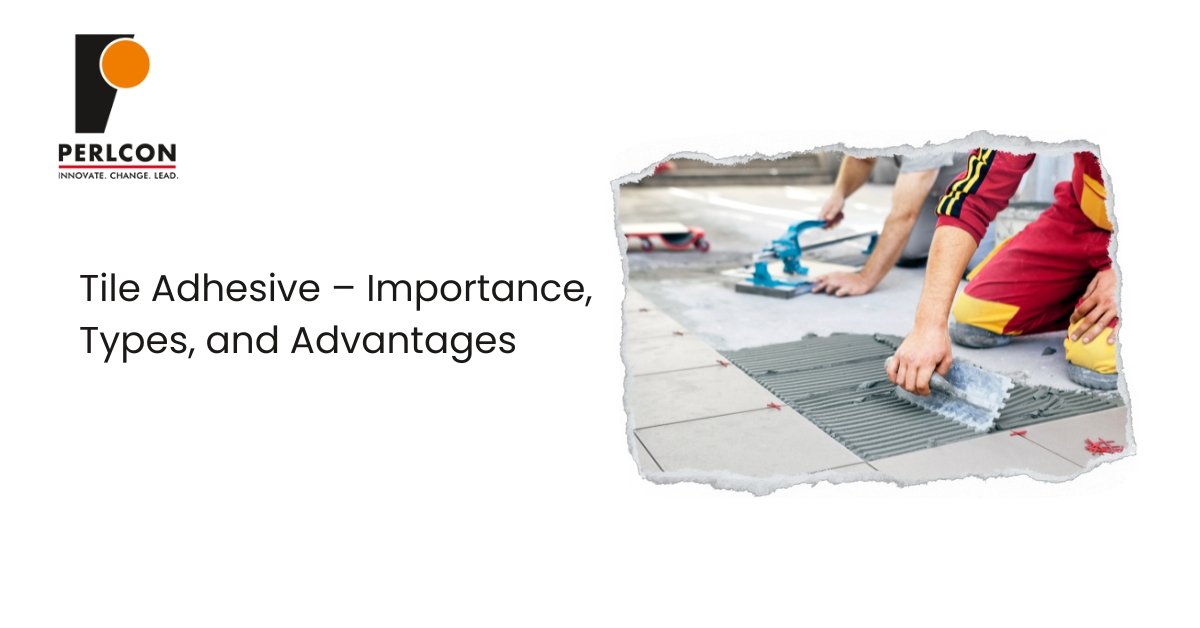When it comes to installing tiles, the right material can make or break the final result — literally. For decades, masons relied on the traditional cement-sand mortar method to fix tiles. While this method worked, it often led to issues like tile debonding, uneven surfaces, and time-consuming application.
Enter Tile Adhesive — a modern solution designed to offer superior bonding strength, faster application, and long-lasting results. If you’re a homeowner, contractor, or architect looking to achieve flawless finishes, understanding tile adhesive and its advantages is essential.
At Perlcon, we specialize in innovative building solutions, including tile adhesive chemicals that meet the needs of both residential and commercial projects.
What is Tile Adhesive?
Tile adhesive is a specially formulated, polymer-modified mixture used to bond tiles to surfaces like floors and walls. Unlike traditional mortar, tile adhesive comes in a ready-to-mix or ready-to-use form, ensuring consistent quality every time.
It is designed to:
- Provide superior bonding between tile and substrate
- Ensure thin, even layers for level flooring
- Resist water and thermal changes
In short, tile adhesive is the smart, modern replacement for the old cement-sand mix.
Importance of Using Tile Adhesive
Choosing the right adhesive is crucial for the durability and aesthetics of your project. Here’s why tile adhesive is a must:
- Better Bonding Strength: Tiles stay firmly in place, reducing the risk of popping or loosening over time.
- Even Application: The pre-mixed formula ensures a smooth and level surface.
- Time and Labor Savings: Faster mixing, application, and curing compared to mortar.
- Durability: Withstands heavy foot traffic, moisture, and temperature fluctuations.
- Compatibility: Works with a wide variety of tile types, including ceramic, porcelain, vitrified, and natural stone.
Types of Tile Adhesives
Different projects require different types of adhesives. Let’s explore the four most common categories:
1. Cement-Based Tile Adhesive
This is the most widely used adhesive, available in powder form. It is mixed with water to create a smooth paste.
- Ideal For: Ceramic, vitrified, and porcelain tiles
- Use Case: Interior and exterior flooring and wall installations
- Benefits: Affordable, easy to use, excellent bonding strength
2. Epoxy Tile Adhesive
Epoxy-based adhesives are made from a mixture of epoxy resin and hardener.
- Ideal For: Industrial spaces, chemical plants, commercial kitchens, swimming pools
- Use Case: Areas exposed to moisture, chemicals, or heavy load
- Benefits: Exceptional bonding strength, chemical resistance, waterproof properties
3. Ready-Mix / Paste Adhesives
These adhesives come pre-mixed in a bucket and are ready to apply directly.
- Ideal For: DIY projects, small areas, quick repairs
- Use Case: Indoor wall tiling, renovation work
- Benefits: No mixing required, saves time, easy application
4. Specialty Adhesives
Specially formulated adhesives are available for unique needs:
- Glass Mosaic Adhesives – Crystal clear bonding
- Large Format Tile Adhesives – Prevent sagging and provide extra grip
- Natural Stone Adhesives – Prevent staining and offer high bond strength
Also Read: 7 Factors Choosing the Right Tile Adhesive for Your Project
Advantages of Tile Adhesive Over Traditional Mortar
Tile adhesive outperforms conventional mortar in almost every way. Here’s how:
- Strong Bonding: Reduces tile pop-ups and ensures long-lasting installation.
- Time Efficiency: Quick setting times speed up project completion.
- Versatility: Works for floors, walls, dry areas, and wet areas like bathrooms.
- Consistency: Pre-mixed composition delivers uniform performance.
- Thin Layer Application: Saves material, reduces weight load on the structure, and keeps surfaces level.
- Water & Heat Resistance: Perfect for kitchens, bathrooms, balconies, and outdoor areas.
Example: A residential project in Mumbai switched from mortar to tile adhesive and reduced installation time by 30%, while achieving a flawless finish with zero hollow sounds under tiles.
How to Select the Right Tile Adhesive
With so many options available, here’s how to choose the right product for your project:
- Consider Tile Type:
- Ceramic and vitrified tiles → Cement-based adhesive
- Natural stone or marble → Specialty adhesive with anti-stain properties
- Ceramic and vitrified tiles → Cement-based adhesive
- Check the Location:
- Outdoor → Adhesive with higher bond strength & weather resistance
- Bathrooms/Kitchens → Water-resistant adhesive
- Outdoor → Adhesive with higher bond strength & weather resistance
- Substrate Condition:
- Ensure the surface is clean, level, and free of dust and oil
- Ensure the surface is clean, level, and free of dust and oil
- Choose a Reliable Brand:
- Look for proven quality and technical support.
- At Perlcon, our tile adhesive chemicals are engineered to meet international standards, ensuring excellent results.
- Look for proven quality and technical support.
Conclusion
The shift from traditional mortar to tile adhesive is not just a trend — it’s a necessity for quality construction. Using the right adhesive ensures better bonding, faster installation, and a professional finish that lasts for years.
At Perlcon, we offer high-performance tile adhesive chemicals that are easy to apply, durable, and cost-effective. Whether you are working on residential flooring, commercial projects, or specialty applications, our solutions help you achieve perfection every time.
Take the Next Step: Contact Perlcon today to choose the right tile adhesive for your project and experience the difference in quality and efficiency.


